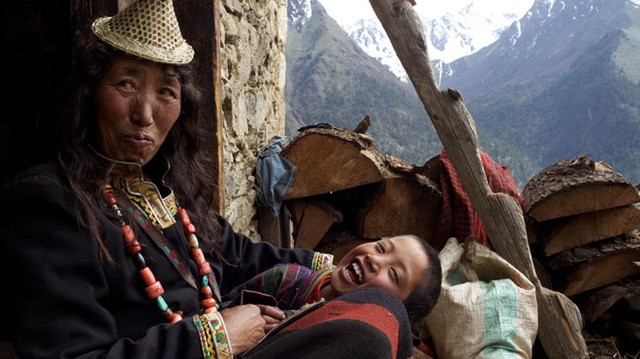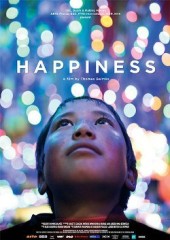 PEYANGKI AND HIS MOTHER IN HAPPINESSA Bhutan boy experiences the world, and TV wrestlingHappiness
PEYANGKI AND HIS MOTHER IN HAPPINESSA Bhutan boy experiences the world, and TV wrestlingHappiness is an act of ethnographic docu-fiction by French filmmaker Thomas Balmès (
Babies). These settings are exotic and authentic, but scenes may be staged and directorial "control" somewhat more "overbearing" than usual, as Stephen Farber noted in
Hollywood Reporter, writing from Sundance. Balnès and his cinematographer Nina Bernfeld follow the sunny-faced 8-year-old Peyangki, a boy in a Himalyan Bhutan village during a time when electricity finally comes and with it cable TV (and maybe computers). The film begins with a film of a 1999 speech by Bhutan's King Jigme Wangchuck announcing TV and Internet will be spread through the country. But it's over a decade later before electricity comes to Peyangki's town of Laya. Two things mainly happen. Peyangki's mother takes him to a small and apparently failing local monastery. His father has died, killed by a bear. There are five other siblings. She needs Peyangki out of the way to take care of the yaks and save on expenses. The boy is cooperative but ambivalent about this transfer.
It's a bit hard to see how Peyangki is "studying" at the monastery, as is implied in conversation. He seems only to repeat a few phrases over and over. It's hard to guess the status of the adult monk and the monastery. Somehow, the boy seems able to leave and come back at will, luckily for him.
Later, in what becomes the film's central and most interesting sequence, Peyankgi's uncle Kinley takes him (playing hooky from monkhood) on a cross country hike to the capital of Thimphu, selling a yak along the way to buy a second TV and bring it back -- to have for when there is TV service, presumably. The first fell off his horse and broke. In Thimphu boy and man enjoy the wonders of the city. Just watching traffic at an intersection fascinates them. Peyangki looks up his sister, who turns out to be working not in the post office as they'd thought but as a club dancer, a secret the boy keeps. In the final scene, the family is gathered around in the dark, the electrical and cable lines completed, watching an American TV wrestling show, wide-eyed and doubtless uncomprehending. "Happiness"? Hardly. But the boy's naive, wide-eyed delight at the wonders of the city on that trip with his uncle is of a purity rarely seen. Without TV or books, everything, even a store mannequin and fish tanks and a bed with sheets, is a new adventure, and Peyangki is up for it.
Balnès uses a fly-on-the wall approach, without inter-titles or commentary. Some scenes are observed from a fair distance and one enjoys the delicate touch, as on the trip to the capital or when the boy and cohorts do somersaults on distant rooftops, or when Peyangki and another boy monk, after their leader heads off to join another monastery, doubtless a more active one, run around enjoying their sudden freedom, waving their robes over their heads like red sails. It works up close too, when an action is happening that can't be faked, like the older boy cutting Peyangki's hair. Outdoors, there are opportunities to savor the dramatic surrounding mountain landscape. The film is best at these moments, not so good when there are conversations, which sometimes feel staged or self-conscious. There's authenticity and authenticity. Still the filmmakers are capturing life on the run, even if sometimes action is so bland that it drags, despite the short run-time.
Happiness, 77 mins., after a Netherlands theatrical opening, debuted at Sundance in early 2014, where it won the World Cinema Documentary Cinematography award and was nominated for the World Cinema Documentary award. Screened for this review as part of the San Francisco International Film Festival where it showed three times, 27 Apr. and 30 Apr at Sundance Kabuki, and 2 May at Berkeley's Pacific Film Archive.






